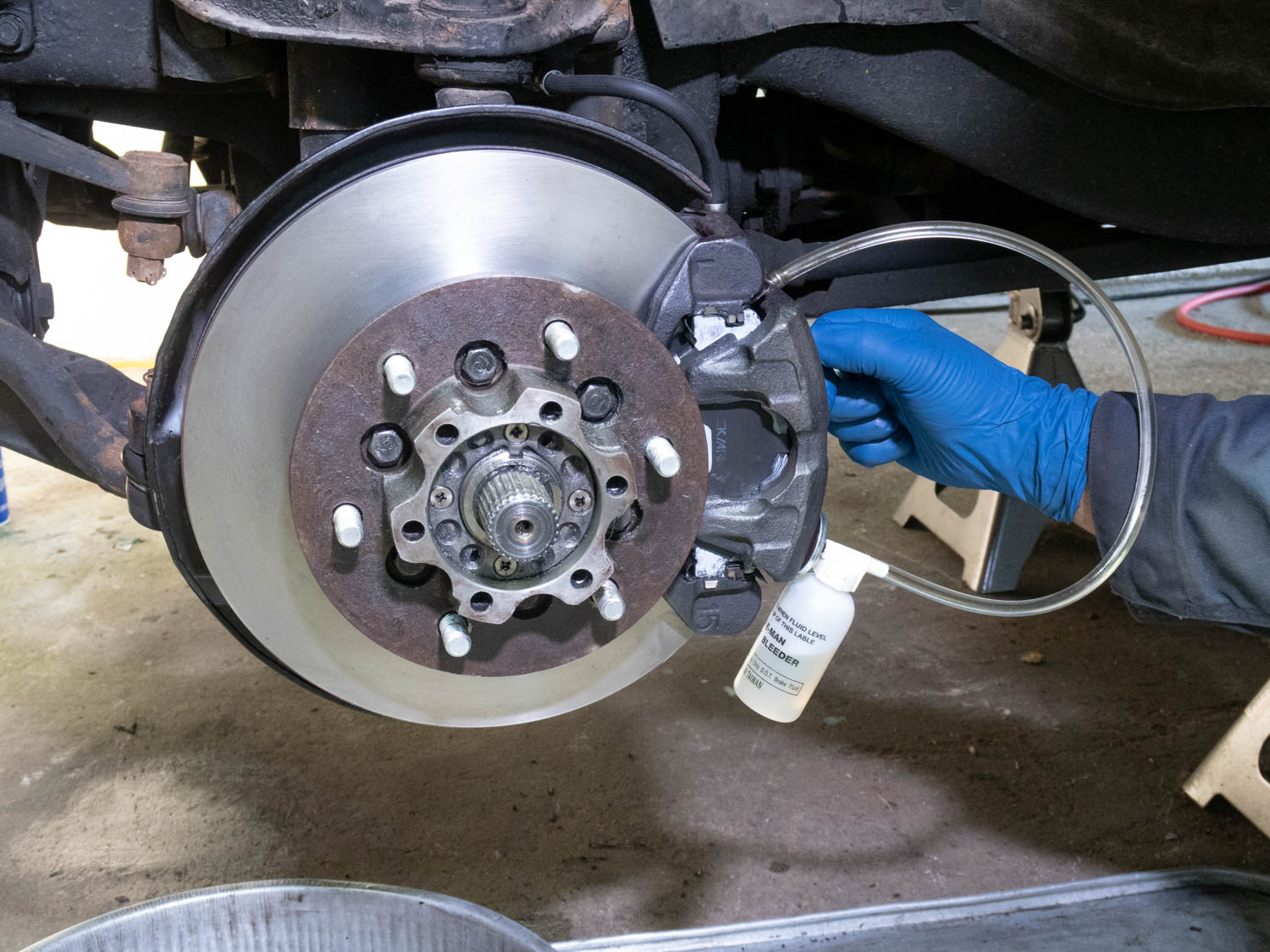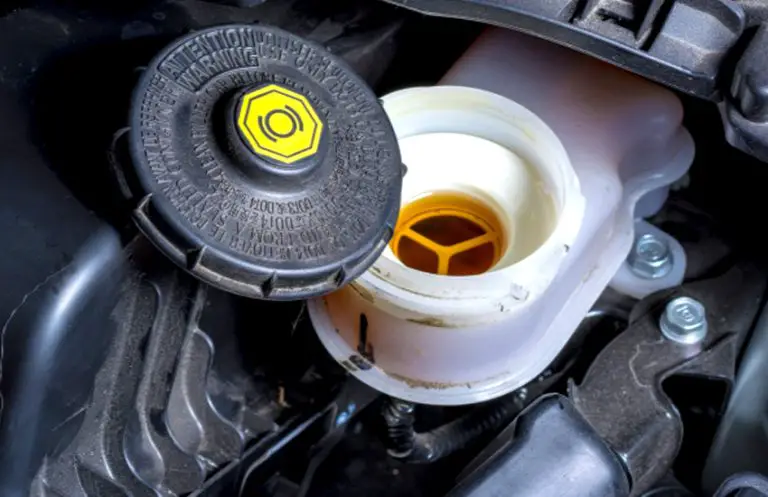No, brake fluid should not be utilized as penetrating oil due to its different properties and potential to damage components. Brake fluid is not designed to penetrate and lubricate like penetrating oil.
In the automotive world, the topic of using brake fluid as a substitute for penetrating oil is a common point of discussion. However, it is important to understand the differences between these two fluids and the potential consequences of using the wrong one.
Brake fluid is primarily used in hydraulic brake systems to transfer force and lubricate moving parts, while penetrating oil is specifically designed to loosen rusted and stuck components. Using brake fluid as penetrating oil can lead to damage and may not effectively serve the intended purpose. We will explore the key distinctions between brake fluid and penetrating oil, and why it is crucial to use the appropriate fluid for each specific application.
What Is Brake Fluid?
What is Brake Fluid? Brake fluid is a type of hydraulic fluid used in hydraulic brake and clutch systems to transfer force under pressure. It plays a crucial role in ensuring smooth and efficient braking performance in vehicles.
Composition
The primary components of brake fluid include glycol ethers and borate esters, which provide the fluid with its unique properties such as high boiling point and viscosity.
Purpose
Brake fluid is designed to transmit force from the brake pedal to the braking system, exerting pressure on the brake pads to slow down or stop the vehicle.
What Is Penetrating Oil?
Before discussing whether brake fluid can be used as penetrating oil, let’s first understand what penetrating oil is.
Definition
Penetrating oil is a lubricating solution with a low viscosity designed to be applied to mechanical components to help loosen rusted or stuck parts.
Uses
Penetrating oil is commonly used for freeing rusted bolts, nuts, and other metal components that have seized due to corrosion or aging.
Can Brake Fluid Be Used As Penetrating Oil?
Can Brake Fluid Be Used as Penetrating Oil?
If you’ve ever been in a situation where a stubborn bolt or nut just won’t budge, you know the frustration it can cause. In times like these, a penetrating oil can be a lifesaver, helping to loosen rusted or seized parts. But what if you find yourself in a pinch with no penetrating oil on hand? Can brake fluid be used as a substitute? Let’s explore the compatibility and pros and cons of using brake fluid as a penetrating oil.
Exploring Compatibility
When it comes to compatibility, brake fluid can be used as a makeshift penetrating oil in certain situations. The main ingredient in most brake fluids is glycol ether, which has some lubricating properties. This can help to loosen stubborn parts to some extent. However, it’s important to note that brake fluid is primarily designed for the hydraulic braking system and not as a penetrating oil. While it may work in some cases, it may not be as effective as a dedicated penetrating oil.
Pros And Cons
Like any improvised solution, using brake fluid as penetrating oil comes with its own set of pros and cons. Let’s take a closer look:
| Pros | Cons |
|---|---|
| 1. Brake fluid is readily available in most automotive stores and garages. | 1. Brake fluid may not be as effective as a dedicated penetrating oil in loosening stubborn parts. |
| 2. It can be a temporary solution when you’re in a pinch and don’t have any penetrating oil on hand. | 2. Brake fluid is not specifically designed for this purpose and may not have the same penetrating capabilities. |
| 3. Brake fluid can help to prevent corrosion and rust on metal surfaces. | 3. Using brake fluid as a substitute may not be recommended by manufacturers, and could potentially damage certain materials or components. |
While brake fluid can serve as a temporary substitute for penetrating oil, it’s important to keep in mind its limitations and potential drawbacks. It may not offer the same level of effectiveness and could potentially cause damage to certain materials or components. It’s always best to use the right tool for the job when it comes to loosening stubborn parts.
Understanding Brake Fluid Properties
Brake fluid has specific properties designed for hydraulic systems and should not be used as penetrating oil due to its different composition and purpose. Using brake fluid for this purpose can damage components and compromise safety. It is essential to understand the distinctions between brake fluid and penetrating oil for optimal vehicle maintenance.
Understanding Brake Fluid Properties Brake fluid is a vital component in a vehicle’s hydraulic brake system, responsible for transferring force into pressure, amplifying braking force. In this post, we will delve into the properties of brake fluid, particularly its viscosity and boiling point, to address the question of whether it can be utilized as a penetrating oil.Viscosity
Brake fluid’s viscosity refers to its resistance to flow. It relates to the fluid’s ability to maintain its thickness and flow evenly. The viscosity of brake fluid is crucial as it determines its effectiveness in transferring force within the brake system.Boiling Point
The boiling point of brake fluid is fundamental as it directly impacts its performance under high-temperature conditions. The boiling point indicates the temperature at which the fluid transitions into vapor, affecting its ability to function optimally in the brake system.Understanding these properties is essential when considering the suitability of brake fluid as a penetrating oil alternative.Understanding Penetrating Oil Properties
Sure, brake fluid should not be utilized as a penetrating oil because it lacks the necessary properties. A penetrating oil needs to have specific qualities such as low surface tension and high capillary action, which brake fluid does not possess.
Using brake fluid in place of penetrating oil can potentially damage the components being worked on.
Understanding Penetrating Oil PropertiesWhen it comes to understanding penetrating oil properties, viscosity, and penetration power are crucial factors. Viscosity refers to a fluid’s resistance to flow, while penetration power denotes its ability to seep into tight spaces, such as rusted or stuck parts.Viscosity
Viscosity plays a significant role in a penetrating oil’s effectiveness. It determines how well the oil can flow into tight spaces, aiding in the loosening of rust and corrosion. A low viscosity oil can penetrate better, making it an essential property for effective penetrating oils.Penetration Power
Penetration power involves the capability of the oil to infiltrate tightly bound areas. A penetrating oil with high penetration power has the ability to seep into the smallest of spaces, effectively breaking down rust and freeing stuck parts.In conclusion, understanding these properties is vital in selecting a suitable penetrating oil for your needs.
Credit: www.ebay.com
Can Brake Fluid Function As A Penetrating Oil?
When it comes to loosening rusted bolts or stuck metal parts, a penetrating oil is often the go-to solution. One common question that arises is whether brake fluid can be utilized as a penetrating oil. In this blog post, we will explore the properties of brake fluid and assess its effectiveness in the role of a penetrating oil.
Comparing Properties
To evaluate whether brake fluid can function as a penetrating oil, it is essential to compare their respective properties. Brake fluid primarily consists of glycol ether compounds along with additives, designed specifically for its intended purpose of hydraulic brake systems. On the other hand, penetrating oils are formulated with low-viscosity lubricants and additives to provide excellent penetration and corrosion resistance.
When comparing the properties of brake fluid and traditional penetrating oils, it becomes evident that they differ significantly. Brake fluid exhibits higher viscosity and is more inclined towards hydraulic functions rather than lubrication. This disparity in properties suggests that brake fluid may not be as effective as a penetrating oil.
Effectiveness
While brake fluid may share some similarities with penetrating oil, such as the ability to displace water, its effectiveness in freeing rusted bolts or stuck metal parts is questionable. This is primarily due to the differences in their composition and purpose. Brake fluid lacks the necessary penetrating and lubricating properties of a dedicated penetrating oil, reducing its ability to break down rust and corrosion effectively.
The low viscosity and potent solvents found in penetrating oils enable them to seep through the tight spaces between rusted parts, effectively loosening them. In contrast, the higher viscosity of brake fluid limits its ability to penetrate and reach inaccessible areas. Moreover, the lack of corrosion-resistant additives may result in the reoccurrence of rust after some time.
| Penetrating Oil | Brake Fluid |
|---|---|
| Low viscosity | Higher viscosity |
| Corrosion-resistant additives | Lacking corrosion-resistant additives |
| Designed for penetration and lubrication | Designed for hydraulic brake systems |
In conclusion, while brake fluid may possess some limited ability to displace water and provide temporary lubrication in certain scenarios, it is not a suitable substitute for dedicated penetrating oils when it comes to freeing rusted bolts and stuck metal parts. For optimal results, it is recommended to use a high-quality penetrating oil specifically formulated for the task at hand.
Safety Considerations
Brake fluid should not be used as a penetrating oil due to safety considerations. It is not designed for that purpose and can cause damage to the components it comes into contact with. It is important to use the right product for each specific application to ensure safety and effectiveness.
Safety ConsiderationsPotential HazardsBrake fluid is flammable and can irritate the skin and eyes.It releases toxic fumes when heated, posing a respiratory hazard.Ensure proper ventilation when working with brake fluid to avoid health risks.Do not use brake fluid near open flames or heat sources.AlternativesConsider using specific penetrating oils designed for this purpose.These alternatives are safer and more effective for loosening rusted parts.
Credit: www.amazon.com

Credit: www.hagerty.com
Conclusion
To sum up, while brake fluid may possess some lubricating properties, it is not an ideal substitute for dedicated penetrating oils. Though it can temporarily help loosen rusted parts, its low viscosity and high water content limit its effectiveness. Therefore, it is recommended to rely on specialized penetrating oils, such as WD-40 or PB Blaster, for the best results when dealing with stuck or rusty components.
Choosing the right tool for the job ensures efficiency and prevents potential damage.


